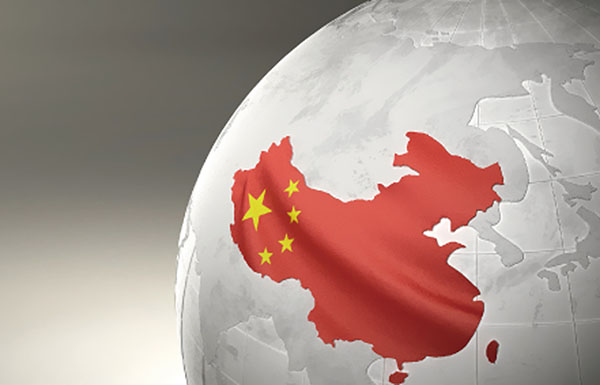
Wall Street Journal comments: "The world's financial leaders started the year worried about China's decelerating economy dragging the world into another major crisis. Now, they're breathing a small sigh of relief. Finance ministers, central bankers and other top officials meeting here in recent days said Beijing's efforts to stabilize its economy have temporarily eased global fears tied to the world's No. 2 economy. "There was not the same level of anxiety," said International Monetary Fund Managing Director Christine Lagarde. In Washington this week, during meetings of the IMF and World Bank through Sunday, officials lauded Beijing's recent efforts and pointed to a calming of global markets. "There's a lot more comfort now in the ability of China to keep demand at a certain level that would foster growth," Mexico's Finance Minister Luis Videgaray said in an interview. U.S. Treasury Secretary Jacob Lew said a new set of policies unveiled by China's National People's Congress last month "addressed some of the core issues, including the very significant challenge of dealing with excess capacity in their economy."
Reuters reports: "China should be flexible in implementing appropriate monetary policy and maintain reasonably ample liquidity, China's central bank governor Zhou Xiaochuan said at a meeting in Washington over the weekend. Zhou also called for all sides to take forceful measures to promote global recovery, including refraining from the use of various forms of trade and investment protectionism. China's economy is off to a good start in 2016, with economic indicators seeing an obvious pick up and the growth of the services sector outpacing that of the manufacturing industry, Zhou said in remarks delivered at a meeting of the International Monetary and Financial Committee.He added that China should vigorously push forward supply side structural reform, as well as better balance the areas of economic growth, structural adjustment and risk prevention. At a separate G20 meeting in Washington last week, Zhou said that China's foreign exchange market has stabilized, the yuan's recent trend reflects market supply and demand, and it has held steady against a basket of currencies."
Reuters reports that China's South China Sea fleets have conducted training drills with upgraded methods that resemble actual combat conditions to increase the fleets' combat effectiveness, according to an article published by the PLA Daily on Sunday. Begun on April 7, the drills include new methods such as training within an electromagnetic environment. Previously, the fleets have also conducted all-weather drills, beyond visibility range training and low-altitude, high-speed exercises to hammer their pilots into shape, the article said. "To think about special situations in an even more complex way, to make the enemy situation even more dangerous, to make the battlefield environment even more lifelike, is an important path in order for the navy and air force to stick close to the demands of real combat and accelerate its transformative production model for fighting strength," division commander Tian Junqing was quoted as saying. The article did not specifically say where in the South China Sea the drills took place.
- 2016-04-15 Senior Chinese Military Officer Visited Dispute Island
- 2016-04-14 China to punish hundreds of officials over vaccine scandal
- 2016-04-13 China's Island Building Hurts Environment, U.S. Report Says
- 2016-04-12 China criticizes G-7 statement on South China Sea
- 2016-04-11 Over 80 Percent of Water Is Polluted in Tested China Wells
- 2016-04-10 UN Praises China's Leadership in Climate Change Deal
- 2016-04-08 Gag order issued on South China Sea? Pentagon and top admiral say no way.
- 2016-04-07 U.S. Adds China’s Internet Controls to List of Trade Barriers
- 2016-04-06 Digital Paper in China Covers Contentious Issues, Now in English
- 2016-04-05 China restricts North Korea trade over nuclear tests
- Wall Street Journal New Gadgets Help Pollution-Weary Chinese Breathe Easier
- The Guardian China finance minister calls Trump 'irrational type' after trade proposal
- Forbes China Credit Growing Four Times Faster Than GDP
- Financial Times China investors target Southeast Asia
- Financial Times Western sanctions 'pushing Russia towards closer ties with China'
- USA Today Asian finance chief: No "hard landing" for China
- Wall Street Journal Q&A: Chinese Finance Minister Lou Jiwei
- Reuters Italy's Giuseppe Tornatore to Shoot Movie for China's Alibaba Pictures
- Wall Street Journal China Makes Plans for 1.8 Million Workers Facing Unemployment
- The Washington Post China criticizes Taiwan for releasing fraud suspects
- The Washington Post Taiwan to send delegation to China to discuss deportations
- Bloomberg China First-Quarter GDP Rises From 3 Months Earlier on Housing
- Bloomberg China's Finance Minister Accuses Credit-Rating Agencies of Bias
- Reuters Pressure builds on Hong Kong leader as many protest at airport
- Forbes The Chill In Venture Funding Is Thawing With GGV's $1.2 Billion Fund And More
- Financial Times Overloaded China users battle 'WeChat fatigue'
- New York Times Race for Latest Class of Nuclear Arms Threatens to Revive Cold War
- www.nationalinterest.org Ignore China and Deploy THAAD to South Korea
- The Diplomat The Cultural Revolution: An Anniversary Steeped in Embarrassment
- Reuters Kobe's retirement a dark day for his fans in China
